Best Healthcare Contract Management | Benefits, Features & Best Practices
Healthcare contract management software simplifies and organizes every stage of the contract lifecycle for healthcare providers. It automates the creation, monitoring, and renewal of contracts, helping organizations manage efficiently.

What Is Healthcare Contract Management?
As the healthcare industry becomes more dynamic and interconnected, managing contracts has grown increasingly complex. Healthcare contract management refers to the structured process of creating, organizing, executing, and tracking contracts within healthcare institutions.
These healthcare contracts often involve vendors, insurance companies, medical professionals, and service providers. The main objective is to ensure transparency, reduce risks, and maintain compliance with legal and financial standards.
Importance of Healthcare Contract Management
With the growing number of healthcare contracts from vendor partnerships to insurance agreements organizations have an incredible opportunity to enhance efficiency and collaboration.
A research by GlobalNewswire highlights this growing shift, projecting that the global healthcare contract management software market will reach USD 9.1 billion by 2032, expanding at a remarkable CAGR of 22.0% between 2024 and 2032. Here’s why effective management of healthcare contracts matters.
1) Regulatory Compliance
Healthcare organizations operate in a highly regulated environment with constant updates to federal, state, and industry-specific standards. Managing multiple global contracts manually can make it difficult to keep track of compliance requirements.
The best healthcare contract management software provides a structured approach to managing contract compliance, allowing organizations to monitor regulatory deadlines.
By doing so, organizations can reduce the likelihood of non-compliance penalties, support audit readiness, and maintain a strong reputation within the industry.
2) Contract Transparency
Understanding who is responsible for each
healthcare contract management is a critical challenge. According to a research by WorldCC, contract responsibility remains unclear in about 40% of organizations, which can result in billing issues, delayed services, regulatory breaches, and revenue losses.
Healthcare contract management software centralizes all contracts in one accessible system, giving teams a clear view of ownership, deadlines, and contractual obligations.
This visibility helps organizations maintain accountability, follow up on pending actions promptly, and make informed decisions about contract renewals or renegotiations.
3) Data-Driven Decisions
Decisions based on limited or fragmented information can hinder organizational performance. A good
healthcare contract management for healthcare gathers all contract data in one place, enabling organizations to analyse contracts, track performance metrics, and generate insights.
For example, teams can identify which vendors consistently meet service standards, which contracts are approaching renewal, or which agreements carry higher financial risk.
By leveraging this information, healthcare leaders can make strategic choices, optimize budgeting, and reduce unnecessary costs while improving overall operational effectiveness.
4) Accountability & Governance
According to a study by KPMG, ineffective contract management practices, including poor oversight of contract closure, can result in losses of up to 40% of a contract’s value.
This shows each action taken on a contract whether creation, review, or execution is logged, giving managers and executives visibility into who handled each task and when.
This level of governance strengthens organizational control, reduces miscommunication, and promotes adherence to internal policies and external regulations.
5) Collaborative Efficiency
Contracts in healthcare involve multiple stakeholders, from legal teams and finance departments to procurement and operations.
Contract management software healthcare provides a shared platform where all stakeholders can access the latest version of a contract, track changes, and review documents in a coordinated way.
This approach improves collaboration, reduces delays in finalizing agreements, and allows teams to focus on strategic initiatives rather than administrative coordination.
From Contracts to Relationships - Contract Management That Works.

How Does Healthcare Contract Management System Works?
Here’s how healthcare contract management works in practice, guiding every stage of a contract’s life cycle from initiation to renewal.
1. Request / Initiation
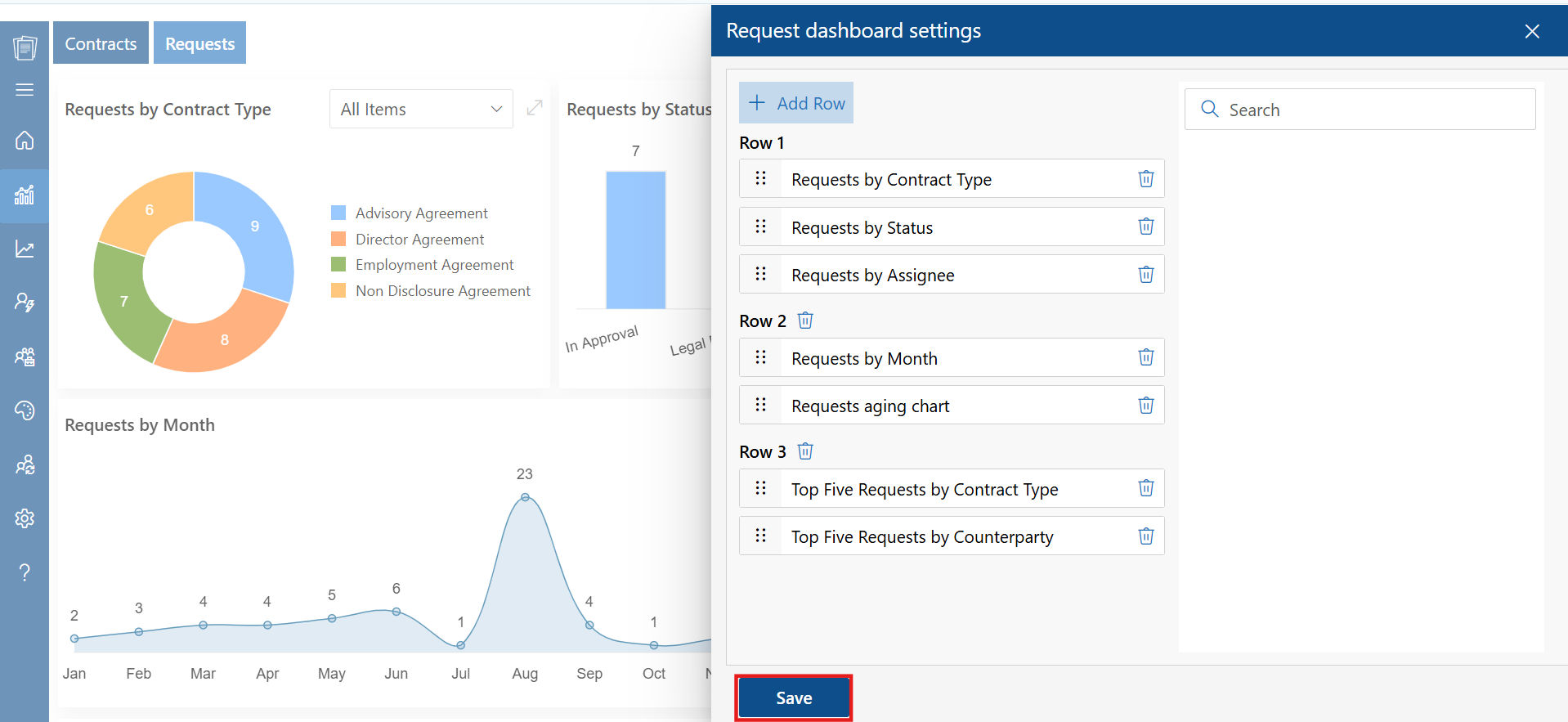
The process begins when a department such as sales, procurement, or HR requests a new contract. At this stage, stakeholders gather essential details, including the purpose, scope of work, participating parties, financial terms, and important deadlines. This information helps set a clear foundation for the agreement before drafting begins.
2. Authoring / Drafting
Once the request is submitted, the next stage is the contract drafting process. Legal or contract management teams use pre-approved templates and standardized clause libraries to create the document. This approach maintains consistency across contracts and helps reduce the time needed to prepare each new agreement.
3. Negotiation
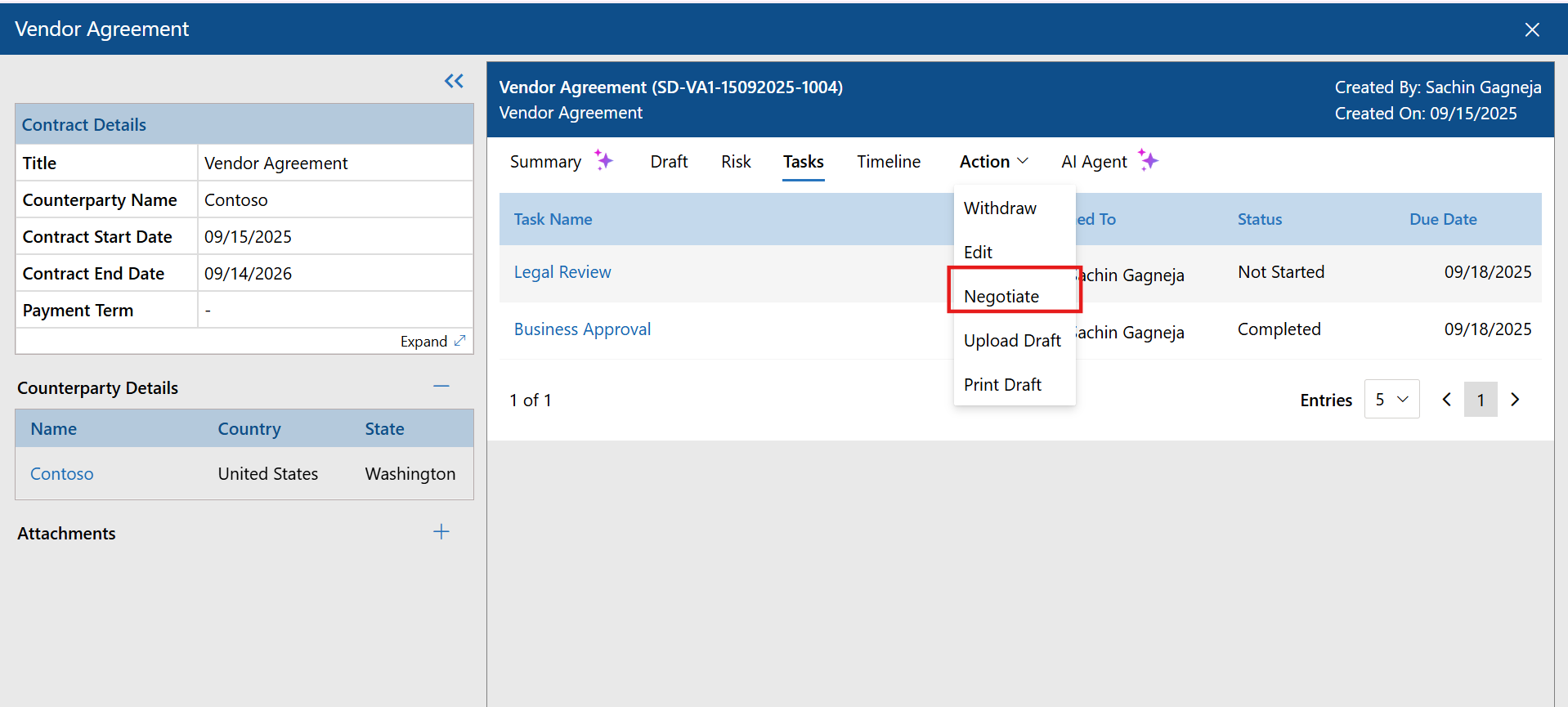
The drafted contract is then shared with the other party for review. Both sides discuss, comment, and revise the document to align on mutually acceptable terms. All modifications are documented during healthcare contract management, allowing teams to maintain a clear record of the contract negotiation workflow.
4. Approval
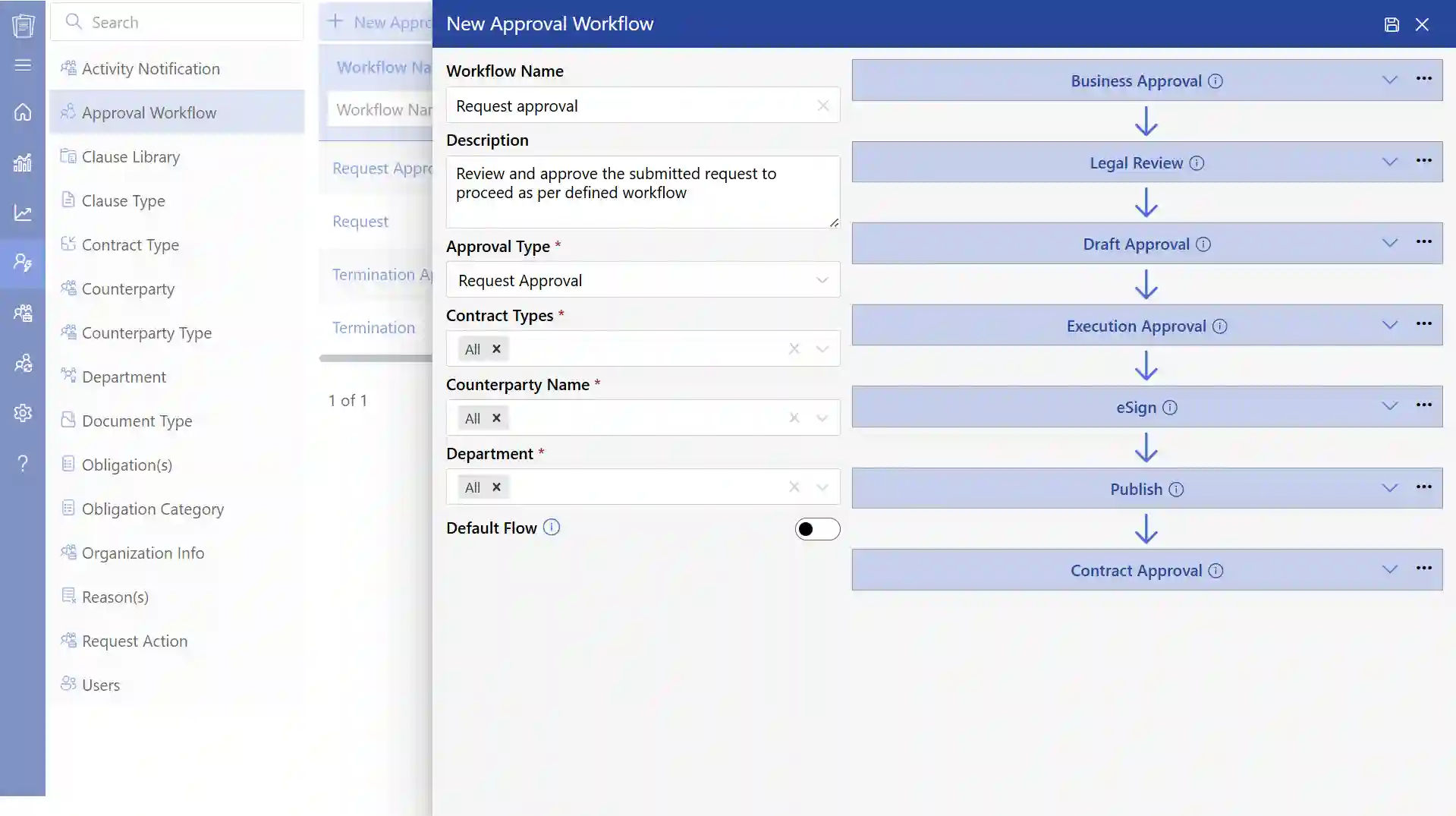
After negotiations are complete, the contract enters the internal approval stage. Depending on the contract’s type and complexity, departments such as legal, finance, or procurement may review and approve the terms. A good contract approval process confirms that the contract meets internal and regulatory standards before it is signed.
5. Execution
After negotiations are complete, the contract enters the internal approval stage. Depending on the contract’s type and complexity, departments such as legal, finance, or procurement may review and approve the terms. A good contract execution process confirms that the contract meets internal and regulatory standards before it is signed.
6. Obligation Management
Following execution, attention turns to contractual obligations the terms outlined in the agreement. Each party tracks deliverables, payments, and timelines to uphold their commitments. Contract management software for healthcare help maintain visibility into these obligations, reducing delays and missed milestones.
7. Compliance and Performance Monitoring
Ongoing monitoring is essential to confirm that the contract is being followed as agreed. This stage involves reviewing key performance indicators, service levels, and compliance with legal or policy requirements. Early identification of potential issues allows teams to take corrective action before they escalate.
8. Renewal or Termination
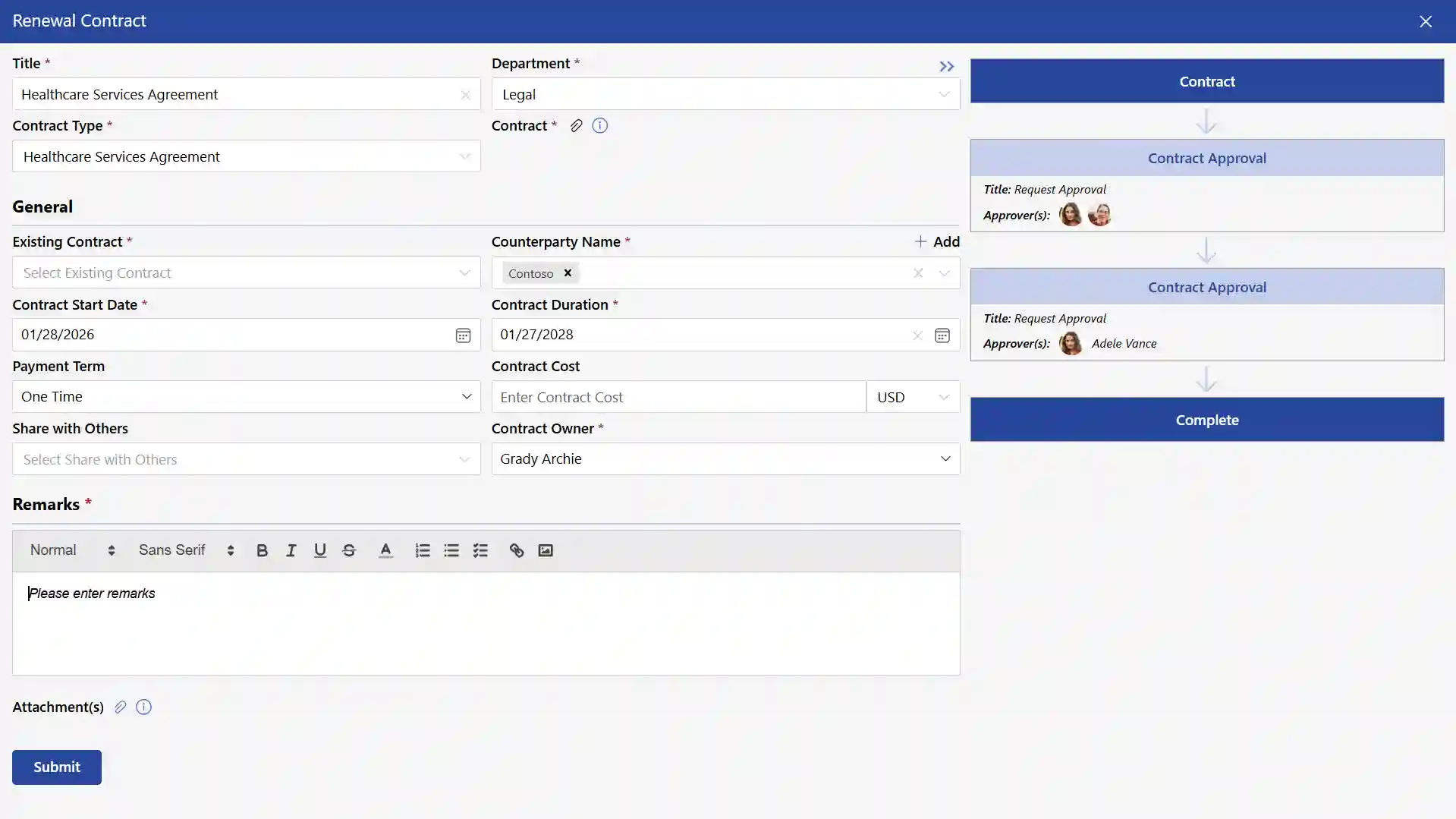
As the contract nears its end date, it is reviewed to determine whether it should be renewed, revised, or terminated. Contract renewal process may involve renegotiating terms or updating clauses to reflect new business or regulatory conditions. If the contract is ending, the contract management software for healthcare
helps guide the termination process to avoid unnecessary risks.
9. Reporting & Analytics
Finally, the healthcare contract management system provides reporting and analytics tools that give insight into contract performance, financial impact, and compliance trends. These contract analytics help organizations identify areas for improvement, enhance decision-making, and strengthen overall contract management practices.
Challenges Faced While Managing Healthcare Contracts
Managing healthcare contracts involves more than drafting and signing agreements. It requires careful coordination among departments, adherence to strict compliance standards, and continuous monitoring of contractual obligations. Here are some common challenges to consider.
1) Compliance
The healthcare sector operates under a complex web of federal and state regulations that evolve regularly. Managing contracts while keeping up with these changes can be demanding.
Healthcare organizations must stay updated with requirements related to patient privacy, reimbursement, and vendor relationships.
Contract management software for healthcare
helps maintain consistency by keeping compliance-related clauses accessible and aligned with the latest standards.
2) Multiple Stakeholder Involvement
Healthcare contracts management often involve several departments such as legal, procurement, finance, and administration each with its own priorities.
Coordinating reviews, inputs, and approvals among multiple stakeholders can extend timelines and create communication gaps.
A structured process helps maintain clarity, keeps discussions organized, and allows teams to move forward with shared understanding.
3) Handling Clauses
Legal teams are usually well-equipped to identify and interpret complex clauses during contract creation.
However, as a contract passes through different departments for review or execution, not everyone may have the same level of familiarity with legal terminology.
This can make it difficult for non-legal staff to recognize clause implications or contractual obligations.
4) Audit Readiness and Data Security Concerns
Maintaining well-documented and accessible contracts is essential for audit readiness. When it comes to healthcare contract management, audits often involve verifying compliance with data protection laws and financial regulations.
Organizing contracts in a secure digital repository helps teams access necessary information quickly while protecting sensitive data from unauthorized use.
A clear audit trail also demonstrates accountability and transparency during review processes.
5) Manual Review Process
Many healthcare organizations still rely on manual methods for reviewing and approving contracts.
This can slow down operations, especially when dealing with a large volume of agreements.
Transitioning to a structured, automated workflow allows teams to handle reviews more efficiently, maintain accuracy, and dedicate more time to strategic activities.
Key Features of Healthcare Contract Management Software
Healthcare organizations handle numerous contracts ranging from vendor agreements to physician partnerships. Below are the key features that make our healthcare contract management software an effective choice for healthcare institutions.
1) AI Agents
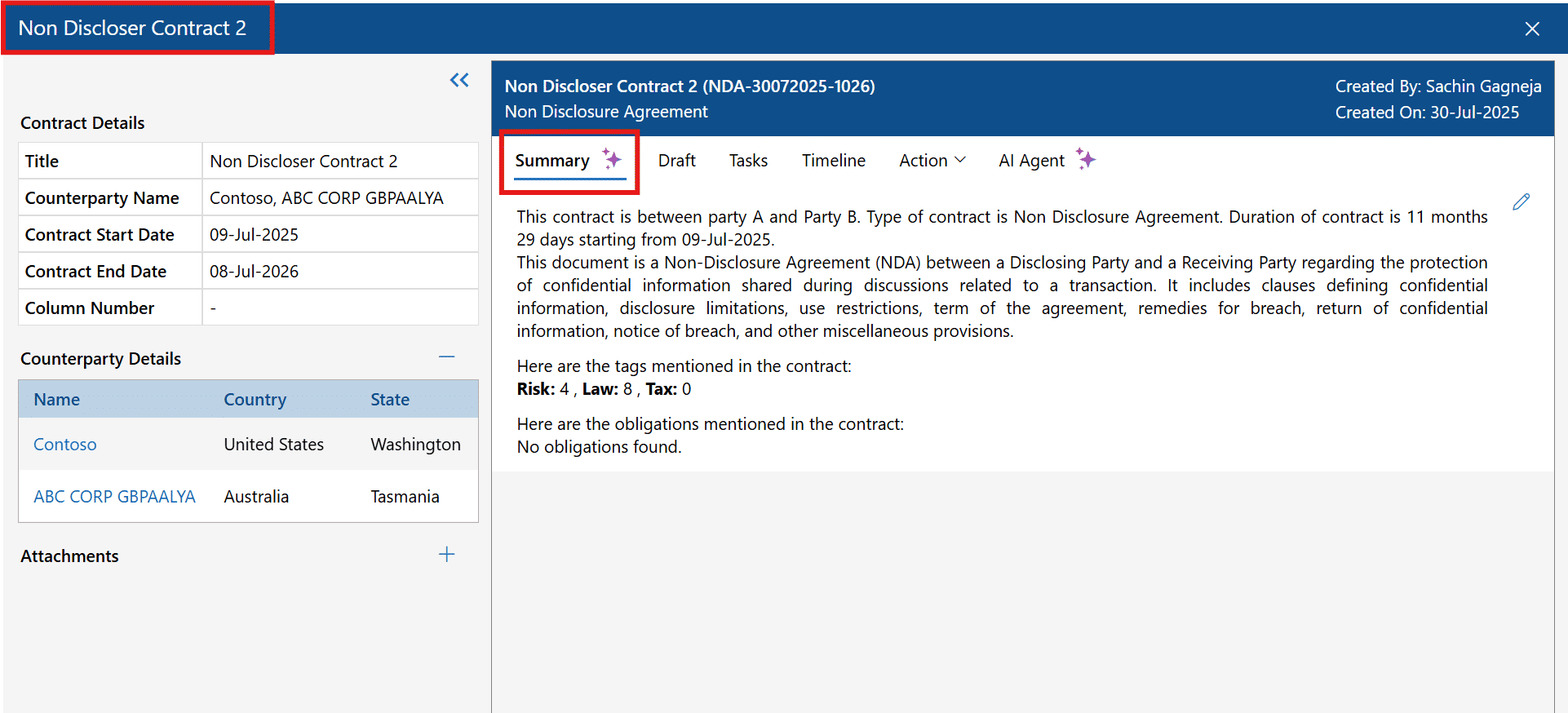
AI-driven agents simplify contract management by instantly summarizing contracts and pinpointing key information such as obligations, risks, and deviations from standard terms.
They also provide intelligent recommendations by suggesting alternate clauses that align with organizational policies.
This capability helps legal and administrative teams make informed decisions without spending hours reviewing every detail.
2) Compliance Management
Maintaining contract compliance in healthcare is crucial, and this feature helps organizations align their contracts with ever-evolving regulations.
The system actively tracks compliance requirements and alerts teams to upcoming policy changes.
It also enables monitoring of key healthcare regulations, reducing the manual effort required to maintain adherence to these frameworks.
3) Easy Contract Drafting
With CLM 365 healthcare contract management software, drafting a contract becomes highly accessible.
Users can initiate and prepare agreements directly from Microsoft Outlook, making it possible to move from communication to creation without leaving the workspace.
Templates, prefilled fields, and smart suggestions enhance accuracy and allow teams to create professional documents in minutes.
3) Multilevel Approval
This feature allows organizations to define multiple layers of authorization for different contract types.
Whether it’s financial, vendor-related, or clinical agreements, contracts can pass through the appropriate chain of command automatically.
Each approval action is logged and timestamped, making it simple to review who approved what and when.
4) Contract Negotiation
Negotiations become more efficient with a collaborative space that enables stakeholders to propose changes, comment on specific sections, and align terms in real time.
Every discussion point and update is documented within the platform, providing a single reference source for all negotiation activities.
This structured format reduces miscommunication and helps finalize contracts faster.
Recommended Read: Contract Negotiation Software: Feature & Benefits
5)Contract Routing
The healthcare agreement management system intelligently directs each contract to relevant departments based on predefined workflow rules.
Whether it needs to go to finance, compliance, or legal, the routing is automatic, minimizing waiting periods and manual forwarding.
This speeds up the overall review process and supports continuous progress across teams.
6) Redlining Feature
Redlining provides a clear comparison between the original and edited versions of a contract.
All insertions, deletions, and changes are visually marked, allowing reviewers to understand every modification instantly. Contract redlining software enhances collaboration by making version changes transparent to all contributors involved in the process.
This feature also accelerates review cycles by reducing manual checks and making it easier for teams to approve finalized documents with confidence.
7) Electronic Signature
The electronic signature feature allows users to sign agreements securely from any location. It uses authentication measures to validate signers and keeps a digital record of each signature for reference.
This not only accelerates the approval cycle but also promotes paperless operations, saving time and administrative costs.
Additionally, it enhances compliance by providing verifiable proof of identity and timestamped records for every signed document.
8) Clause Library
The built-in clause library provides users with instant access to a collection of pre-approved and customizable legal clauses.
It allows teams to insert accurate and compliant language for areas such as confidentiality, liability, and data protection with just a few clicks.
This feature promotes uniformity across all contracts, improves drafting speed, and helps legal teams maintain up-to-date standards without manual verification.
9) Automation Capabilities
According to a 2023 survey by HealthTech Magazine, 87% of medical facilities have started integrating digital tools to optimize workflow, including contract management systems.
The contract automation feature within CLM 365 plays a vital role in this transformation. It handles routine tasks such as scheduling reminders, triggering renewal notifications, and managing follow-ups.
Teams can configure automated alerts for key milestones, allowing them to focus on strategic decision-making instead of administrative tracking.
10) Audit Trail
Every activity performed within the contract lifecycle is captured through a detailed audit trail. This includes edits, reviews, approvals, signatures, renewals, and access logs.
It serves as a comprehensive record that can be referenced during compliance checks, audits, or performance evaluations.
By maintaining a transparent history of all actions, this feature strengthens accountability and provides organizations with full visibility into contract activities.
11) Version Control
A contract version control maintains a comprehensive record of every draft and revision associated with a contract.
Users can easily access older versions, compare updates, or revert to previous editions when required.
This feature provides clarity on document evolution and prevents confusion when multiple contributors are involved.
12) Contract Modification
The contract modification feature allows users to make authorized changes to existing agreements without disrupting the contract’s continuity.
Whether updating terms, adjusting obligations, or adding new clauses, all modifications are tracked and timestamped for full transparency.
This capability ensures that every amendment is documented, reviewed, and approved within the platform, maintaining accuracy and consistency across all contract versions.
Benefits of Using Contract Management Software in Healthcare
After exploring the key features of CLM 365’s healthcare contract lifecycle management, it’s equally important to understand how these features translate into tangible benefits for healthcare organizations. Here are some of the major benefits of using the system:
1) Supports Scalability
CLM 365’s healthcare contract management software supports business growth with ease.
Whether a hospital is expanding its network or adding new vendors, the system adapts to evolving needs through flexible configurations.
Its customizable workflows allow organizations to modify processes based on their size, structure, and compliance requirements, making it a future-ready solution for growing healthcare providers.
2) Cost Savings
The healthcare agreement management platform automates and manages most legal and administrative workflows, reducing the need for extensive manual oversight.
This directly cuts down on operational expenses, legal service costs, and time spent on repetitive tasks.
By optimizing how contracts are created, reviewed, and renewed, organizations can allocate their resources more effectively toward patient care and strategic goals.
3) Collaborative Contract Management
In traditional contract handling, departments often work in isolation, leading to misalignment and inefficiency.
With CLM 365 healthcare contract management software, every department from legal and finance to procurement and compliance can work together in a single, centralized system.
This collaborative contract management approach promotes clear communication, reduces delays, and helps all stakeholders stay aligned throughout the contract lifecycle.
4) Robust Security
Built within Microsoft’s secure infrastructure, the system offers dependable protection for sensitive healthcare data.
Every contract transaction, approval, and modification takes place in a controlled environment backed by enterprise-grade security standards.
This provides healthcare organizations with assurance that their contracts and patient-related agreements are secure throughout the entire lifecycle.
5) Enhanced Visibility
The contract management software for healthcare provides complete visibility into contract status, milestones, and renewals.
Decision-makers can monitor contract progress in real time, uncover potential risks early, and take informed actions promptly.
With all contract information available on a single dashboard, teams gain better contract visibility, improving accountability and coordination across departments.
6) Data-Driven Decisions
With integrated analytics and reporting tools, CLM 365 empowers healthcare organizations to make smarter decisions.
Contract trends, performance metrics, and renewal histories can be analysed to identify improvement areas and optimize vendor management strategies.
Data-driven insights transform how healthcare providers approach compliance, negotiations, and resource planning.
7) Strong Vendor Relationships
CLM 365’s reliable contract management features make vendor handling more efficient and transparent.
By maintaining accurate records, setting clear expectations, and enabling timely renewals or modifications, the system strengthens business relationships with vendors.
This consistency fosters mutual trust and helps build long-term partnerships that contribute to better vendor contract management and supply chain reliability.
| Aspects | Manual Process | Healthcare Contract Management Software |
| Approval Workflows | Sequential “email tag” process; prone to bottlenecks and lost messages. | Automated routing to legal, finance simultaneously. |
| Data Security | Minimal and hard to control sensitive information | Provides enterprise-grade security to your contract’s workflows |
| Document Storage | Scattered across physical files, local hard drives, and email inboxes. | A single, secure digital vault for all healthcare agreements. |
| Review Process | Manual reviews and consumer too much of time | Helps legal and non-legal teams to summarize complex clause with help of AI |
| Version Control | Multiple versions (v1, v2, FINAL_v3) lead to confusion and legal errors. | Automated versioning ensures everyone works on the latest draft. |
Best Practices to Manage Healthcare Agreements
Effective contract management in healthcare requires more than just having the right software. Below are seven best practices with actionable steps to strengthen how healthcare organizations manage their agreements.
1. Centralize All Agreements in One Repository
A contract repository system is the foundation of efficient agreement management. It allows easy access, reduces administrative overhead, and keeps all contract versions organized.
- Store all agreements vendor, physician, and payer in a secure, cloud-based repository.
- Categorize contracts by department, type, and renewal period for quick retrieval.
- Assign document owners responsible for maintaining updates and records.
2. Standardize Contract Templates and Clauses
Effective use of pre-approved templates helps healthcare organizations save time, maintain compliance, and ensure consistency across departments. Leveraging the existing contract clause fully allows teams to focus on strategic contract management rather than manual drafting.
- Select the most appropriate pre-approved template for each new agreement to reduce drafting time.
- Customize clauses only when necessary, ensuring changes comply with regulatory standards.
- Track template usage and gather feedback to optimize future contract creation and improve efficiency.
3. Automate Renewal and Expiry Alerts
Manual tracking of contract deadlines can lead to missed renewals and disruptions. Utilize automated reminders effectively keep key stakeholders informed and proactive.
- Set automated notifications for critical dates like renewals, expirations, and reviews.
- Use dashboards to monitor upcoming deadlines across all agreements.
- Establish clear escalation workflows for contracts nearing expiration.
4. Involve Key Stakeholders Early
Engaging all relevant departments early in the contract lifecycle management process promotes better decision-making and compliance alignment.
- Include legal, finance, and procurement teams during the drafting phase.
- Encourage transparent communication for clause revisions or risk reviews.
- Use collaborative tools to document stakeholder feedback in one place.
5. Leverage Data Insights for Performance Tracking
Analysing contract data provides valuable insights into vendor performance and financial efficiency. These insights help healthcare organizations make informed decisions, optimize resources, and strengthen overall contract outcomes.
- Track key metrics such as renewal frequency, contract value, and vendor performance.
- Use data dashboards to identify cost-saving opportunities.
- Review contract reports monthly to support informed decision-making.
Simplify Healthcare Agreements with CLM 365
CLM 365 is built within the Microsoft ecosystem, providing direct connections with Teams, Outlook, SharePoint, Word, Power BI, and Copilot.
The platform combines AI-driven tools and automation to simplify contract management, helping legal teams reduce effort and focus on high-value tasks.
With strong enterprise-level security and an intuitive interface, CLM 365 allows organizations to efficiently oversee all contracts while supporting teams in negotiating and managing agreements with accuracy and effectiveness.
How to Integrate CLM 365 into Your Current Workflow
- Assess your existing contract processes to identify bottlenecks and areas for improvement.
- Catalog the tools and platforms currently used for drafting, approvals, and document storage.
- Enable CLM 365 and link it with your Microsoft 365 environment.
- Connect the platform to Outlook, Teams, SharePoint, Copilot, and the Word plugin for seamless collaboration.
- Configure approval chains, assign role-based access, and activate automated notifications for key contract events.
- Provide hands-on training for your team using practical scenarios and concise user guides.
- Monitor contract activities, evaluate performance improvements, and continuously refine your workflows.
- Leverage the AI Agent to generate contract summaries, flag critical obligations, and highlight potential risks reducing the need for manual review of entire documents.
Note: For a complete overview of the system workflow, please visit our knowledge base.
Conclusion
Managing healthcare contracts doesn’t have to be complex or risky. With CLM 365, you gain complete visibility, seamless compliance, and effortless control over every contract lifecycle ensuring your organization stays efficient, accurate, and secure.
Start your 14-day free trial of CLM 365 now and see how smarter contract management can transform your healthcare operations.
Vendor Trust Starts with Secure Contract Management
A platform to securely organize, monitor, and manage healthcare contract lifecycle management.
Frequently Asked Questions
What is the ROI of implementing CLM in healthcare?
Implementing CLM delivers high ROI by significantly reducing contract cycle times, minimizing compliance risks, preventing errors, improving revenue capture, and streamlining contract management workflows across the organization.
What does a healthcare contract manager do?
A healthcare contract manager oversees the entire lifecycle of contracts, ensures regulatory compliance, negotiates favourable terms, tracks renewals and obligations, and maintains accurate and organized contract documentation.
How is AI effective in handling healthcare contract management?
AI enhances contract management by automating contract review, quickly identifying potential risks, extracting and analysing key clauses, predicting compliance issues, and accelerating approvals to improve efficiency and accuracy.
Does CLM 365 help compare contracts?
Yes, CLM 365 allows users to easily compare contracts, highlighting differences, changes, and key clauses to ensure accuracy and compliance.
Does CLM 365 offer customization?
Yes, CLM 365 offers customization to fit your business needs and workflow preferences. Users can tailor fields, templates, and approvals as per your process.
Can SharePoint CLM 365 manage physician contracts?
Yes, it helps handle physician contracts by handling drafting, approvals, renewals, and compliance tracking in one centralized system.























